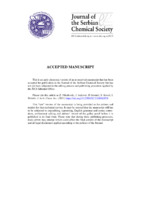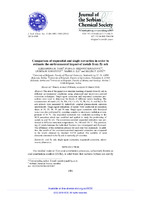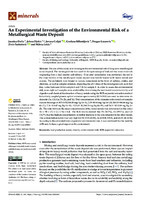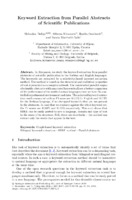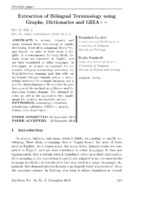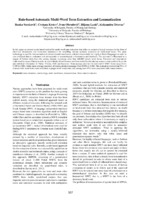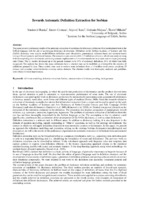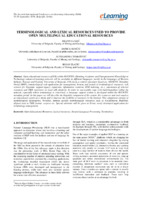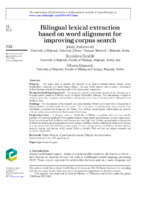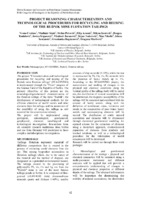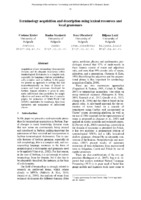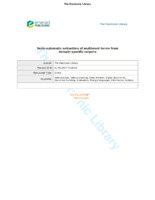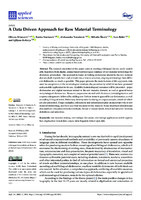Претрага
177 items
-
Some examples of interactions between certain rare earth elements and soil
... poorer adsorbent for this elements (Table V). The results of sequential extraction for lanthanum and neodymium Values of the initial concentration of lanthanum and neodymium ions in the soils, results from different phases of extraction and the extracted amount of metal ions from the different types ...
... neodymium ions through different phases of extraction has been shown in Figs. S-1 and S-2 of the supplementary material of this paper, respectively. Table VI. Concentration of rare earth elements (REE) in μg g-1 for three types of soil obtained by sequential extraction Element Type of soil Element Type ...
... types, it would be beneficial to protect the soil with polymer or similar non-permeable material. The method of sequential extraction based on the results presented is suitable for extraction of rare earth elements from sand and clay type of soils. Humus soil has demonstrated more intensive sorption ...Zlatko Nikolovski, Jelena Isailović, Dejan Jeremić, Sabina Kovač, Ilija Brčeski. "Some examples of interactions between certain rare earth elements and soil" in Journal of the Serbian Chemical Society, National Library of Serbia (2021). https://doi.org/10.2298/JSC211006095N
-
Comparison of sequential and single extraction in order to estimate environmental impact of metals from fly ash
летећи пепео угља, екстракција са једним агенсом, секвенцијална екстракција, микроталасне пећнице, ултраталасиAleksandra Tasić, Ivana Sredović-Ignjatović, Ljubiša Ignjatović, Marija Ilić, Mališa Antić. "Comparison of sequential and single extraction in order to estimate environmental impact of metals from fly ash" in Journal of the Serbian Chemical Society (2016). https://doi.org/10.2298/JSC160307038T
-
An Experimental Investigation of the Environmental Risk of a Metallurgical Waste Deposit
Jasmina Dedić , Jelena Djokic , Jovana Galjak, Gordana Milentijević, Dragan Lazarevic, Živče Šarkočević, Milena Lekić (2022)The aim of this study is to investigate the environmental risk of long-term metallurgical waste disposal. The investigated site was used for the open storage of lead and zinc waste materials originating from a lead smelter and refinery. Even after remediation was performed, the soil in the close vicinity of the metallurgical waste deposit was heavily loaded with heavy metals and arsenic. The pollutants were bound in various compounds in the form of sulfides, oxides, and chlorides, as well ...Jasmina Dedić , Jelena Djokic , Jovana Galjak, Gordana Milentijević, Dragan Lazarevic, Živče Šarkočević, Milena Lekić. "An Experimental Investigation of the Environmental Risk of a Metallurgical Waste Deposit" in Minerals, MDPI, Basel, Switzerland. (2022). https://doi.org/10.3390/min12060661
-
Keyword Extraction from Parallel Abstracts of Scientific Publications
... text. Keywords: Graph-based keyword extraction Bilingual keyword extraction · SBKE method · Parallel abstracts 1 Introduction The task of keyword extraction is to automatically identify a set of terms that best describes the document [1,2]. Keyword extraction can be a demanding task, especially when ...
... keyword extraction from bilingual or multilingual tex- tual sources. In such a case, a keyword extraction method should be insensitive to natural language or appropriate for extraction in different natural languages at the same time. One of the open research questions in the keyword extraction task is ...
... report the extraction from par- allel texts of different languages with bilingual keyword annotations. To the best of our knowledge, this will present a graph-based keyword extraction for parallel abstracts in scientific articles for the first time, as well as a new bilingual keyword extraction dataset ...Slobodan Beliga, Olivera Kitanović, Ranka Stanković, Sanda Martinčić-Ipšić . "Keyword Extraction from Parallel Abstracts of Scientific Publications" in Sematic Keyword-Based Search on Structured Data Sources - Third International KEYSTONE Conference, IKC 2017 Gdańsk, Poland, September 11–12, 2017 Revised Selected Papers and COST Action IC1302 Reports, Springer (2017)
-
Extraction of Bilingual Terminology Using Graphs, Dictionaries and GIZA++
Branislava Šandrih, Ranka Stanković (2020)U nauci, industriji i mnogim istraživačkim oblastima, terminologija se brzo razvija. Najčešće, jezik koji je „lingua franca“ za većinu ovih oblasti je engleski. Kao posledica toga, za mnoga polja termini domena su koncipirani na engleskom, a kasnije se prevode na druge jezike. U ovom radu predstavljamo pristup za automatsko izdvajanje dvojezične terminologije za englesko-srpski jezički par koji se oslanja na usaglašeni dvojezični korpus domena, ekstraktor terminologije za ciljni jezik i alat za usklađivanje delova. Ispitujemo performanse metode na domenu ...... Terminology Extraction 5 TermEx Infotheca Vol. 19, No. 2, December 2019 123 Šandrih B., Stanković R., “Extraction of Bilingual . . . ”, pp. 119–138 This list can be either an external resource from the same domain or obtained from the text. The only system developed specifically for the extraction of MWTs ...
... information). A Software solution for multi-word units extraction displayed in Figure 2 offers possibilities for general NLP processing on selected corpus (apply- ing lexical resources, generating bag of words and extraction of unknown words), extraction of selected syntactic patterns applying specified op- ...
... For automatic extraction and lemmatisation, the system calls Unitex command-line functions in the background to apply appropriate graphs. Infotheca Vol. 19, No. 2, December 2019 125 Šandrih B., Stanković R., “Extraction of Bilingual . . . ”, pp. 119–138 Figure 1. A FST for extraction of type N4X ...Branislava Šandrih, Ranka Stanković. "Extraction of Bilingual Terminology Using Graphs, Dictionaries and GIZA++" in Infotheca, Faculty of Philology, University of Belgrade (2020). https://doi.org/10.18485/infotheca.2019.19.2.6
-
Rule-based Automatic Multi-word Term Extraction and Lemmatization
In this paper we present a rule-based method for multi-word term extraction that relies on extensive lexical resources in the form of electronic dictionaries and finite-state transducers for modelling various syntactic structures of multi-word terms. The same technology is used for lemmatization of extracted multi-word terms, which is unavoidable for highly inflected languages in order to pass extracted data to evaluators and subsequently to terminological e-dictionaries and databases. The approach is illustrated on a corpus of Serbian texts from ...... and graphs in Section 4. The solution to terminology extraction outlined in this paper will by all means speed up the development of e-dictionaries, as in addition to the terminology extraction, the approach can be applied to the extraction of MWUs belonging to general lexica. Expanding the e- ...
... Automatic Multi-word Term Extraction and Lemmatization Ranka Stanković, Cvetana Krstev, Ivan Obradović, Biljana Lazić, Aleksandra Trtovac Дигитални репозиторијум Рударско-геолошког факултета Универзитета у Београду [ДР РГФ] Rule-based Automatic Multi-word Term Extraction and Lemmatization | Ranka ...
... 97% were associated with correct lemmas. Keywords: term extraction, terminology, multi-word units, lemmatization, finite-state transducers 1. Motivation Various approaches have been proposed for multi-word term (MWT) extraction as this problem has been gaining in importance in the field ...Ranka Stanković, Cvetana Krstev, Ivan Obradović, Biljana Lazić, Aleksandra Trtovac. "Rule-based Automatic Multi-word Term Extraction and Lemmatization" in Proceedings of the 10th International Conference on Language Resources and Evaluation, LREC 2016, Portorož, Slovenia, 23--28 May 2016, European Language Resources Association (2016)
-
Corpus-based bilingual terminology extraction in the power engineering domain
Ovaj rad predstavlja resurse i alate koji se koriste za ekstrkciju i evaluaciju dvojezične, englesko-srpske terminologije u domenu energetike. Resursi se sastoje od postojeće opšte i domenske leksike i domenskog paralelnog korpusa; alati uključuju ekstraktore termina za oba jezika i alat za poravnavanje segmenata koji pripadaju korpusnim rečenicama. Sistem je testiran variranjem funkcije podudaranja koja utvrđuje prisustvo ekstrahovanog termina u poravnatom segmentu (odsečak), u rasponu od veoma labavog do strogog. Procena rezultata je pokazala da je preciznost izdvajanja termina ...Tanja Ivanović, Ranka Stanković, Branislava Šandrih Todorović, Cvetana Krstev. "Corpus-based bilingual terminology extraction in the power engineering domain" in Terminology, John Benjamins Publishing Company (2022). https://doi.org/10.1075/term.20038.iva
-
Two approaches to compilation of bilingual multi-word terminology lists from lexical resources
In this paper, we present two approaches and the implemented system for bilingual terminology extraction that rely on an aligned bilingual domain corpus, a terminology extractor for a target language, and a tool for chunk alignment. The two approaches differ in the way terminology for the source language is obtained: the first relies on an existing domain terminology lexicon, while the second one uses a term extraction tool. For both approaches, four experiments were performed with two parameters being ...Branislava Šandrih, Cvetana Krstev, Ranka Stanković. "Two approaches to compilation of bilingual multi-word terminology lists from lexical resources" in Natural Language Engineering, Cambridge University Press (CUP) (2020). https://doi.org/10.1017/S1351324919000615
-
Towards Automatic Definition Extraction for Serbian
U radu su prikazani preliminarni rezultati automatske ekstrakcije kandidata za definicije rečnika iz nestrukturiranih tekstova na srpskom jeziku u cilju ubrzanja razvoja rečnika. Definicije u rečniku Srpske akademije nauka i umetnosti (SANU) korišćene su za modelovanje različitih tipova definicija (opisnih, gramatičkih, referentnih i sinonimskih) koje imaju različite sintaksičke i leksičke karakteristike. Korpus istraživanja sastoji se od 61.213 definicija imenica, koje su analizirane korišćenjem morfoloških e-rečnika i lokalnih gramatika implementiranih kao pretvarači konačnih stanja u paketu za obradu korpusa otvorenog ...... a sentence classification task (i.e., containing term-definition pairs or not) or a sequential labelling task (i.e. identifying the boundaries of terms and definitions). The previous work on definition extraction can be classified as follows: 1) the rule-based approach with linguistic rules and templates ...
... 2021), we focused our present research on the extraction of the sentences contained in the definition. The extraction also implies recognition of paradigmatic lexical relations, e.g. synonyms, antonyms, hypernyms, hyponyms. The problem of automatic extraction of definitions from the text has not been ...
... approach for definition modelling and extraction, relying on the existing Serbian dictionaries (morphological and descriptive), as well as the results of the preliminary experiments in automatic extraction of definitions from unstructured Serbian text. Definition extraction task can be formalized either ...Ranka Stanković, Cvetana Krstev, Rada Stijović, Mirjana Gočanin, Mihailo Škorić. "Towards Automatic Definition Extraction for Serbian" in Proceedings of the XIX EURALEX Congress of the European Assocition for Lexicography: Lexicography for Inclusion (Volume 2). 7-9 September (virtual), Democritus University of Thrace (2021)
-
Terminological and lexical resources used to provide open multilingual educational resources
Open educational resources (OER) within BAEKTEL (Blending Academic and Entrepreneurial Knowledge in Technology enhanced learning) network will be available in different languages, mostly in the languages of Western Balkans, Russian and English. University of Belgrade (UB) hosts a central repository based on: BAEKTEL Metadata Portal (BMP), terminological web application for management, browse and search of terminological resources, web services for linguistic support (query expansion, information retrieval, OER indexing, etc.), annotation of selected resources and OER repository on local edX ...... semiautomatic approach for term recognition, extraction and lemmatization. Picture 1 illustrates steps in terminology extraction. Crucial resources are morphological dictionaries and grammars. They are combined with some statistical measures for term extraction. The first step is analysis of terms in ...
... specific domains (e. g. law, biomedicine, mythology, culinary etc.). 5. TERMINOLOGY EXTRACTION Bearing in mind rapid changes in scientific domains and new terms production, automatic terminology recognition and extraction has become an important task. The extracted terms are then included in ontologies ...
... unsystematic and subjective [12], [14]. Automatic term extraction is a process that is meant to facilitate this painstaking task and identify terms less obvious to humans by using computer aided techniques. For now, the automatic extraction is used as a preliminary process, to 5 Available at the ...Biljana Lazić, Danica Seničić, Aleksandra Tomašević, Bojan Zlatić. "Terminological and lexical resources used to provide open multilingual educational resources" in The Seventh International Conference on eLearning (eLearning-2016), 29-30 September 2016, Belgrade, Serbia, Belgrade : Belgrade Metropolitan University (2016)
-
Bilingual lexical extraction based on word alignment for improving corpus search
Jelena Andonovski, Branislava Šandrih, Olivera Kitanović. "Bilingual lexical extraction based on word alignment for improving corpus search" in The Electronic Library, Emerald (2019). https://doi.org/10.1108/EL-03-2019-0056
-
Project REASONING: Characterization and technological procedures for recycling and reusing of the rudnik mine flotation tailings
Vesna Cvetkov, Vladimir Simić, Stefan Petrović, Filip Arnaut, Milena Kostović, Dragan Radulović, Jovica Stojanović, Vladimir Jovanović, Dejan Todorović, Nina Nikolić, Jelena Senćanski, Grozdanka Bogdanović, Dragana Marilović (2024)Vesna Cvetkov, Vladimir Simić, Stefan Petrović, Filip Arnaut, Milena Kostović, Dragan Radulović, Jovica Stojanović, Vladimir Jovanović, Dejan Todorović, Nina Nikolić, Jelena Senćanski, Grozdanka Bogdanović, Dragana Marilović. "Project REASONING: Characterization and technological procedures for recycling and reusing of the rudnik mine flotation tailings" in 5th Congress Geologists of the Republic of North Macedonia, Ohrid, 28-29. 10. 2024, Македонско геолошко друштво (2024)
-
Global trend and negative synergy: Climate changes and groundwater over-extraction
Stevanović Zoran (2013)Stevanović Zoran. "Global trend and negative synergy: Climate changes and groundwater over-extraction" in Proceedings of the International Conference “Climate Change Impact on Water Resources”, 17-18 Oct.2013, Belgrade, Belgrade:Institute of Wat. Manag. J.Cerni & WSDAC (2013): 42-45
-
Groundwater management by riverbank filtration and an infiltration channel, the case of Obrenovac, Serbia
Dušan Polomčić, Bojan Hajdin, Zoran Stevanović, Dragoljub Bajić, Katarina Hajdin. "Groundwater management by riverbank filtration and an infiltration channel, the case of Obrenovac, Serbia" in Hydrogeology Journal, Berlin, Heidelberg : Springer, International Association of Hydrogeologists (2013). https://doi.org/10.1007/s10040-013-1025-9
-
Application of contour blasting for the extraction of dimension stone blocks
Kričak Lazar, Negovanović Milanka, Janković Ivan, Zeković D., Mitrović S.. "Application of contour blasting for the extraction of dimension stone blocks" in Proceedings of the 2nd International Conference „Harmony of nature and spirituality in stone“, Kragujevac, Serbia:Stone Studio Association, (2012): 79-85
-
Hydrodynamic analysis of potential groundwater extraction capacity increase: case study of Nelt groundwater source at Dobanovci
Bajić Dragoljub, Polomčić Dušan, Ratković Jelena, Matić Ivan. "Hydrodynamic analysis of potential groundwater extraction capacity increase: case study of Nelt groundwater source at Dobanovci" in Tehnika 4 no. 68, Belgrade:Union of Engineers and Technicians of Serbia (2017): 512-525. https://doi.org/10.5937/tehnika1704512B
-
Terminology Acquisition and Description Using Lexical Resources and Local Grammars
Acquisition of new terminology from specific domains and its adequate description within terminological dictionaries is a complex task, especially for languages that are morphologically complex such as Serbian. In this paper we present an approach to solving this task semi-automatically on basis of lexical resources and local grammars developed for Serbian. Special attention is given to automatic inflectional class prediction for simple adjectives and nouns and the use of syntactic graphs for extraction of Multi-Word Unit (MWU) candidates for ...... edge of the caterpillar”. 4.2 Extraction of MWUs from domain texts The extraction of MWUs from a text is preceded by the retrieval of new simple word terms from it and their incorporation in the existing system of morphological e-dictionaries as MWU extraction relies heavily on existing lexical ...
... cover- ing the dictionary of lemmas FST class prediction can be divided into two parts: one is extraction of implicit knowledge and the other is actual prediction of FST class for a new lemma. Extraction of implicit knowledge in the form of a dataset with word endings, grammatical categories and ...
... inflectional classes for newly retrieved MWUs are obtained – they are derived directly from local grammars used for their extraction. 4.3 Evaluation of performance of MWU extraction In order to evaluate our approach, we applied it to a collection of 74 papers in Serbian from the journal Infotheca ...Cvetana Krstev, Ranka Stanković, Ivan Obradović, Biljana Lazić. "Terminology Acquisition and Description Using Lexical Resources and Local Grammars" in Proceedings of the 11th Conference on Terminology and Artificial Intelligence, Granada, Spain, 2015, Granada : LexiCon (Universidad de Granada) (2015)
-
Using Query Expansion for Cross-Lingual Mathematical Terminology Extraction
Velislava Stoykova, Ranka Stanković (2018)Velislava Stoykova, Ranka Stanković. "Using Query Expansion for Cross-Lingual Mathematical Terminology Extraction" in Advances in Intelligent Systems and Computing, Springer International Publishing (2018). https://doi.org/10.1007/978-3-319-91189-2_16
-
Semi-Automatic Extraction of Multiword Terms from Domain-Specific Corpora
Vesna Pajić, Staša Vujičić Stanković, Ranka Stanković, Miloš Pajić. "Semi-Automatic Extraction of Multiword Terms from Domain-Specific Corpora" in The Electronic Library 36 no. 3, Emerald Publishing Limited (2018): 550-567. https://doi.org/10.1108/EL-06-2017-0128
-
A Data Driven Approach for Raw Material Terminology
Olivera Kitanović, Ranka Stanković, Aleksandra Tomašević, Mihailo Škorić, Ivan Babić, Ljiljana Kolonja (2021)The research presented in this paper aims at creating a bilingual (sr-en), easily searchable, hypertext, born-digital, corpus-based terminological database of raw material terminology for dictionary production. The approach is based on linking dictionaries related to the raw material domain, both digitally born and printed, into a lexicon structure, aligning terminology from different dictionaries as much as possible. This paper presents the main features of this approach, data used for compilation of the terminological database, the procedure by which it has ...sirovine, rudarstvo, terminologija, rečnik, terminološka aplikacija, mobilna aplikacija, digitizacija, leksički podaci, korpusi, otvoreni povezani podaci... systems have proved to yield the best solutions [71]. Besides monolingual term extraction, we also followed a different approach when it comes to bilingual term extraction [72,73]. We first perform monolingual extraction of domain-specific terms, using available terminology extractors, and then, given ...
... research [27,39,40] that proved successful for bilingual term extraction in other domains, where one language is Serbian. The Sketch-engine [9] has different types of extraction implemented, for various lan- guages, starting with keyword extraction, word sketches, usage examples, and thesaurus, but it is ...
... publishing (moving from paper to online) and, with the begin- ning of the corpus era, by access to corpora supported by (semi)automatic extraction of terms. Automatic data extraction comprises data that is automatically obtained from cor- pora of authentic language use, which is then subjected to lexicographers’ ...Olivera Kitanović, Ranka Stanković, Aleksandra Tomašević, Mihailo Škorić, Ivan Babić, Ljiljana Kolonja. "A Data Driven Approach for Raw Material Terminology" in Applied Sciences, MDPI AG (2021). https://doi.org/10.3390/app11072892
